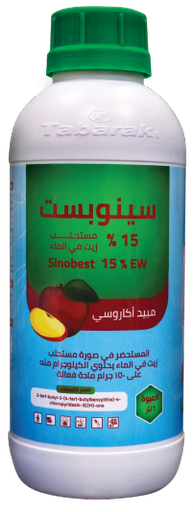Sinobest 15% EW
Pyridaben 15%
Product Overview
Sinobest 15% EW is a highly effective acaricide specifically formulated for the control of spider mites in apple orchards. Its precise formulation ensures targeted action against these damaging pests, minimizing harm to beneficial insects and the environment.
Chemical Composition
Pyridaben: A potent acaricide effective against a wide range of spider mite species. Its mode of action disrupts the mite's nervous system, leading to rapid mortality.
Application and Dosage
Sinobest 15% EW is applied as a foliar spray directly to the apple trees. The recommended dosage is:
Pyridaben: 15% (as per product formulation)
Always follow the instructions on the product label for precise application rates and safety precautions. Adjust application frequency based on the severity of the infestation and environmental conditions. Regular monitoring of mite populations is crucial for optimal pest management.
Mode of Action
Pyridaben, the active ingredient in Sinobest 15% EW, functions as a potent inhibitor of the mitochondrial electron transport chain in spider mites. This mechanism disrupts the mites' energy production, leading to paralysis and eventual death. Its systemic properties allow for effective control even when mites are hidden within leaf tissue.
Precautions and Safety
Always wear appropriate personal protective equipment (PPE), including gloves, goggles, and protective clothing, when handling and applying Sinobest 15% EW. Avoid direct contact with skin and eyes. Store in a cool, dry place, away from children and pets. Dispose of empty containers responsibly according to local regulations. Consult the product label for detailed safety information and first-aid instructions.
Environmental Considerations
While Sinobest 15% EW is highly effective against spider mites, it is important to use it responsibly to minimize potential impacts on the environment. Follow application guidelines carefully to avoid unnecessary pesticide drift. Consider integrated pest management (IPM) strategies, which may include biological control methods, to reduce reliance on chemical pesticides.
